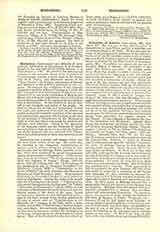

Eustathius, Greek savant and defender of monasticism, Archbishop of Thessalonica b. at Constantinople in the early part of the twelfth century; d. at Thessalonica c. 1194. He received his ecclesiastical training in the monastic school of St. Euphemia at Constantinople, became a monk there in the monastery of St. Florus, and afterwards deacon of the “Great Church” (St. Sophia), and teacher of rhetoric and secretary of the petitions addressed to the emperor. He enjoyed the confidence of the Comneni emperors, especially of Manuel Comnenus I (1143-80) who intrusted to him the education of one of his sons. About 1174 he was made Archbishop of Myra in Asia Minor; but before his installation, was transferred to the archiepiscopal See of Thessalonica by special direction of the emperor. In this position he proved himself a real shepherd and father of his people. He tried to reform the worldly and hypocritical lives of the monks and anchorites of his time; he shielded his people against the excessive exactions of the imperial tax-collectors; he remained with his flock at the time of the invasion of Thessalonica by the Normans of Sicily in 1185, and tried to encourage his subjects and alleviate their sufferings. Owing to his opposition to the monastic orders and his frankness of speech towards those in high places, he incurred the displeasure of the emperor and was removed from Thessalonica for a brief period; at what time, however, is not known.
Eustathius was a prolific and elegant writer, and the best Greek author of his age. His works may be classified in two categories: commentaries on ancient authors written during his activity in Constantinople; and his writings, tracts, orations, or letters, which were occasioned by special circumstances during his episcopate in Thessalonica. Of the former class may be mentioned: “The Commentaries on the Iliad and Odyssey of Homer” (Rome, 1542-50; Basle, 1559-60; Leipzig, 1825-30); “A Paraphrase of the geographical epic of Dionysius Periegetes”, ed. Bernhardy (Leipzig, 1828); a “Commentary on the works of Pindar”, of which, however, only the preface is known, ed. Tafel (Frankfurt, 1832). These works of Eustathius on the ancient classics are much prized by modern philologists. Among the works of the second class the following are to be noted: “A History of the conquest of Thessalonica by the Normans” (ed. Tafel in “Komnenen and Normannen”, 2d ed., 1870); several addresses to the Emperor Manuel Comnenus I, and the funeral oration at the death of the same; letters written to the emperor or other distinguished personages of his time; several tracts having reference to his plan of reform, such as: “Considerations on the Monastie Life” (German tr. by Tafel, 1847); a letter written to a stylite of Thessalonica; a tract on hypocrisy; and others. Several purely religious works such as: four Lenten sermons; a sermon for the beginning of the year; and panegyrics for the festivals of various saints. Most of his theological works, first edited by Tafel (1832), are in Migne, P.G., CXXXV, CXXXVI. In these Eustathius shows himself an earnest and zealous ecclesiastic, fully penetrated with the genuine spirit of Christianity.
FRANCIS J. SCHAEFER

